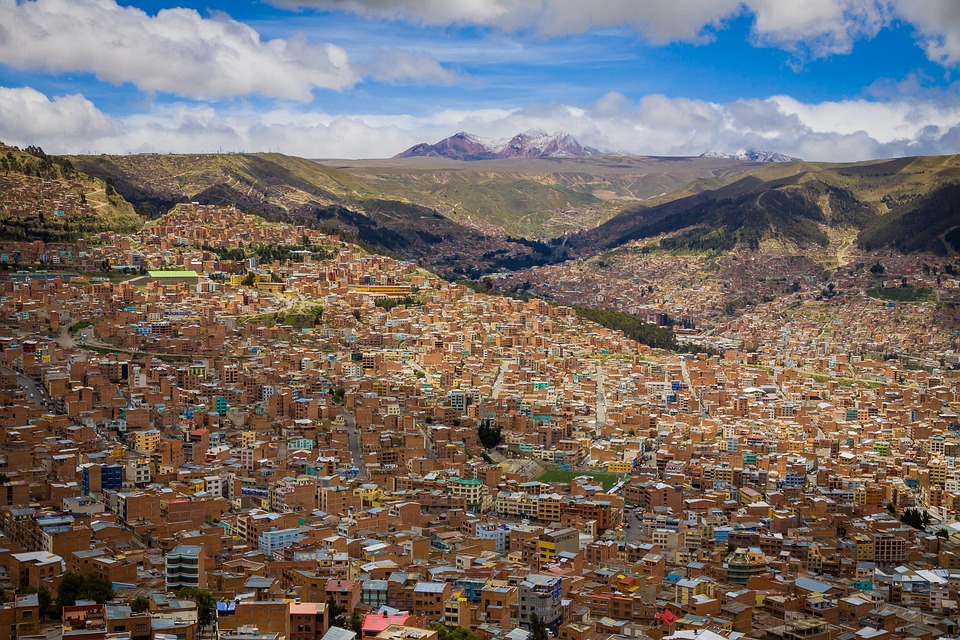Bolivia, named after Simon Bolivar, the Venezuelan leader who played a major role in Bolivia’s independence from Spain, is wedged between Chile, Peru, Paraguay, Argentina and Brazil. Bolivia is an amazing country of contrasts with unmatched deposits of silver, tin, zinc, natural gas, and enough lithium to power all of our modern devices for centuries, With all that, Bolivia should be a wealthy country. But is one of the poorest countries in the western hemisphere, only slightly better off than Haiti.
Since its “discovery” by the Spanish in the 1500s until today, Bolivia has historically been on the short end of the stick in deals and wars with Spain, Britain, the United States, Chile, Brazil, Paraguay, and Argentina, all in partnership with its small upper class that has historically exploited its natural resources a labor.
Bolivia is known for natural beauty and underdevelopment compared to its neighbors. From the world’s largest salt in the southwest, Salar de Uyuni, where visitors can find pink flamingos in the 11,000 sq-km landscape, to rainforest, El Camino de La Muerte and other natural wonders, Bolivia is an incredibly interesting country.
Bolivia’s capital, La Paz, is the highest capital city in the world, checking in at ~11,500 feet, (3,500 meters) and the airport is the 5th highest in the world, at 13,323 feet (4033M). As of July 2017, Bolivia’s population is a bit over 11M, of which 51.31% are under 25. Bolivia is landlocked, and 18.9% of its exports last year went to neighboring Brazil and 11.2% went to Argentina.
Compared to the region, Bolivia is much less developed, outside of certain areas in Santa Cruz, the wealthiest city in Bolivia and small parts of La Paz. The education system, infrastructure, and government system all need work. However, these areas have seen massive advances over the past 15 years, leading to Bolivia’s 5.3% PPP GDP growth to $78.66 billion, but only $34B in nominal GDP. This puts Bolivia on par with Wyoming’s GDP but with 20x more people. The average wage is about 2,000 BOB monthly, roughly $289 US dollars. With the rise in GDP, Bolivia saw growth in the construction and telecommunications industries. The World Bank’s 2017 Doing Business report ranked Bolivia 149th out of 190 countries, making it one of the hardest places to do business in the world.
Bolivia is rich in resources, however, due to past policies, Bolivia has rejected foreign aid which has also capped its growth. Current President Evo Morales is a controversial figure, as he has clearly made improvements to the lives of the poorest Bolivians, but he has been criticized for hampering growth. President Morales says he is working to create more open policies to help expand the economy and hopefully create a more competitive landscape, but it remains to be seen whether he will do it.
Although the economy is fairly small and Bolivia is one of the poorest countries in the region, GDP is on the rise and so are some Bolivian entrepreneurs. Startups involving real estate and enterprise are popping up. UltraCasas is a platform where interested parties can search for real estate and filter by price and neighborhood. According to Camilo Eid, the current COO, UltraCasas was the first Bolivian startup to receive foreign funding. Amerpages is the digital form of the yellow pages. The online platform provides a directory for LatAm businesses, offering more than 25 million businesses the chance to advertise in over seven languages. Users can receive significant discounts on listed businesses, from restaurants to hotels.
Jorge Velasco started Innova Bolivia with a mission to connect startups with venture capitalists. The platform supports innovative ideas and encourages entrepreneurs to take their entrepreneurial ventures to the next level.
Though a new concept for many, coworking spaces like Makecowork are also beginning to pop up in big cities. Currently, the most interesting opportunities in Bolivia are more traditional businesses that happen to use technology. It’s not likely that entrepreneurs will use Bolivia as a base to target clients in the region, but more local businesses or export businesses are on the rise.
Companies like Virtu worked with Bolivian artisans to create amazing alpaca pullovers, which then were exported to the US and Europe. Bolivians are hard working and many are just looking for an opportunity to do well. Bolivia is well behind countries like Chile, Argentina, Peru, and others in Latin America, but there are certainly opportunities for entrepreneurs who would like to take a higher degree of risk. It’s also an amazing country for tourism, to places like La Paz, Lake Titicaca, Uyuni, Potosi, Sucre, and more. I really enjoy visiting Bolivia and the people are some of the most friendly in Latin America, so I’m rooting for continued growth and a better economy for everyone.
